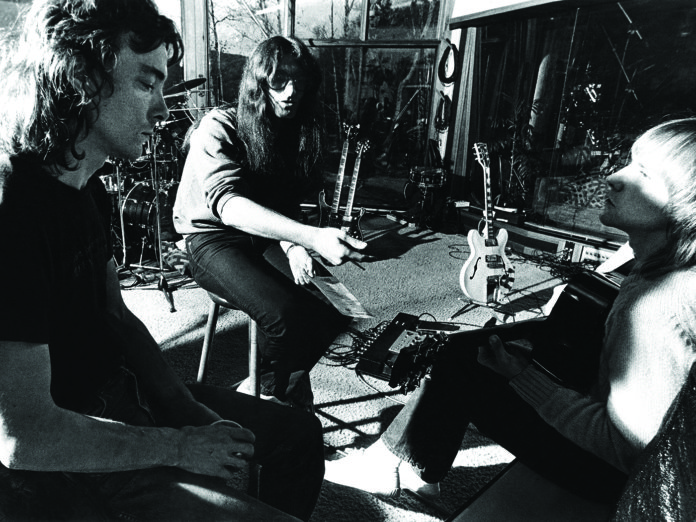You can certainly see the appeal of Rush for a certain teenage rocker of the ’70s and ’80s. Here was a band who seemed to take all the hallmarks of prog rock – the technical proficiency, the slightly manic intensity, the fiddly time signatures, the switches in tempo, the bombastic fanfares, the poetic-sounding lyrics – and distil them into an easily digestible heavy metal format.
This process of distillation was helped by the fact that there were only three members. Neil Peart played like Gene Krupa in a metal band, thumping furiously around every square inch of his enormous kit but never forgetting his overriding duty to groove. Alex Lifeson switched between fiddly lead guitar lines and thrashy rhythm playing, and Geddy Lee played muscular basslines while singing in a faintly hysterical full-throated tenor yelp – Jon Anderson’s elfin tones taken into satanic territory. Even with Lee overdubbing the odd keyboard part, things were kept as stripped back and brutalist as prog metal can get. “I don’t know about numerology or anything mystical,” said Neil Peart, “but there’s something good about three people.”
Plenty of teenage metal fans – including the likes of Dave Grohl, Beck and Stephen Malkmus – thought they’d discovered the Holy Grail when they came across Rush’s 1976 LP 2112, a concept album based on the sci-fi novella Anthem by the bonkers right-wing libertarian Ayn Rand. But this 1980 release has held up much, much better, partly because you can hear them tentatively making links between prog and punk. Lead track “The Spirit Of Radio” – their only real UK hit – successfully squeezes Rush’s oeuvre into a five-minute piece of compressed power pop, with chiming guitars, a funky undertow and even a reggae diversion. It’s not a million miles away from what The Police were doing at the time, and you can even hear Lifeson playing the kind of hands-free sustained guitar arpeggios that we associate with Andy Summers or The Edge.
“Freewill” is another tight, punky track that grooves far more effectively than any song in the arcane time signature of 13/4 has any right to do. “You can choose a ready guide in some celestial voice,” Peart’s lyric mockingly suggests. “You can choose from phantom fears and kindness that can kill/I will choose a path that’s clear, I will choose free will.” It initially suggests the influence of Rand’s rational libertarianism but seems to be more of a defiant hymn to muscular secularism – more Christopher Hitchens than Ayn Rand.
Permanent Waves also sees Rush stepping outside their comfort zone with two mid-tempo ballads. “Entre Nous” is reminiscent of the kind of crossover track that Genesis were writing on Duke or Abacab around this time, with Lee seeming to sand down the more abrasive edges of his voice to reveal a much more expressive vocalist. Peart’s lyric is presented as an intellectual love song – exploring the conflict between affection and individualism (“We are planets to each other, drifting in our orbits”) and serves as a companion piece to “Different Strings”, a similar ballad exploring the difficulties of love and friendship, but this one with lyrics written by Lee. Weirdly, the latter fades out around the 3:50 mark, just at the point where Rush would usually launch into the third part of a symphonic epic.
Some of these proggier elements still survive. “Jacob’s Ladder” is a chugging piece of metal with sword-and-sorcery lyrics and some baffling jolts in metre, while “Natural Science” is another episodic piece, packed with enough ideas for an entire career. However, for a band who share many characteristics of prog, Rush’s music rarely recalls the bluesy improvisatory feel of the Pink Floyds and Led Zeps with whom they’re sometimes compared, something evident on the live section of this package. These 16 tracks from their 1980 tour are quite distinct from any of Rush’s dozen or so other live albums. Having made the leap from the student union circuit to five nights at the Hammersmith Odeon, they respond by playing with an uncharacteristic rawness.
Even when Rush are being complex, there’s a spartan intensity that seems to prefigure the NWOBHM bands that they would inspire. Two fast and furious live versions of tracks from 1975’s Fly By Night – “Beneath, Between & Behind” at the Manchester Apollo and a surprisingly concise version of “By-Tor And The Snowdog” at the Hammersmith Odeon – are both transformed into galloping NWOBHM howlers, with Lee’s shrieking voice sounding like Bruce Dickinson. Premonitions of Iron Maiden are also evident on the proggier tracks like “Cygnus X1 Book II” (from 1978’s Hemispheres) or “A Passage To Bangkok” (from 2112), while even the twinkly “Closer To The Heart” takes on a rather punky abandon. Never mind heavy metal – this is garage prog.
Extras: 8/10. Various editions may include previously unreleased live tracks, notepad, tour programmes, book, laminates and a poster.



